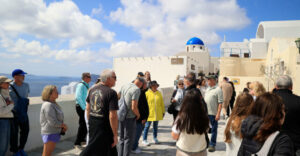The proportion of vaccinated Greeks and those positive towards getting the jab showed a steady rise from January to October 2021, but after that remained either relatively stable or marginally increasing, according to the last three polls, with the small increase coming mainly from the elderly.
At the beginning of 2022, 9% of Greeks – that is, almost one in ten – ruled out getting the vaccine, while 8% are still hesitant (answering “maybe yes/maybe no”). Overall, the percentage of those who refuse to or hesitate is around 17%.
This is the data according to the latest research by Focus Bari YouGov, which conducted eight nationwide surveys monitoring the ratio of vaccinated, positive, skeptical, and negative Greeks to the Covid-19 vaccine from January until the last days of December 2021.
According to the results of the last measurement carried out between December 21-31 in a sample of 1,002 Greeks aged 18-74:
Slightly more than four in five Greeks (83%) have already made/have an appointment/will definitely get the vaccine.
Younger people up to the age of 44 have the highest rates of reluctance, while a steady proportion of “negative attitudes” are observed across all age groups. The majority of those negatives to the vax (15%) and most hesitant (13%) are in the 25-34 age group, while those over 55 are 8% completely against getting it and 5% hesitant.
also read
Ex-porn star Jenna Jameson cannot walk after being reportedly diagnosed with rare syndrome
For Covid-19 vaccine deniers, the main reason they claim is their refusal to do something that is forced on them (65%, ie two out of three), followed by those questioning the vaccine and its adverse effects on the population health.
The majority of those denying the jab (57%) believe that the vaccine “is not tested/is experimental”, 43% “are afraid of long-term side effects”, 29% “are afraid of immediate side effects”, 21% believe that the pandemic is fabricated or misleading “, while 14% state that they belong to a special group that cannot be vaccinated.
Female deniers are a little more (9%) than men (8%), while they are also more hesitant (10% versus 7% of men).
Residents of Thessaloniki are more negative (13%) and more hesitant (10%) compared to residents of Athens (11% and 7% respectively) and the country as a whole (8% and 9%).
Ask me anything
Explore related questions





